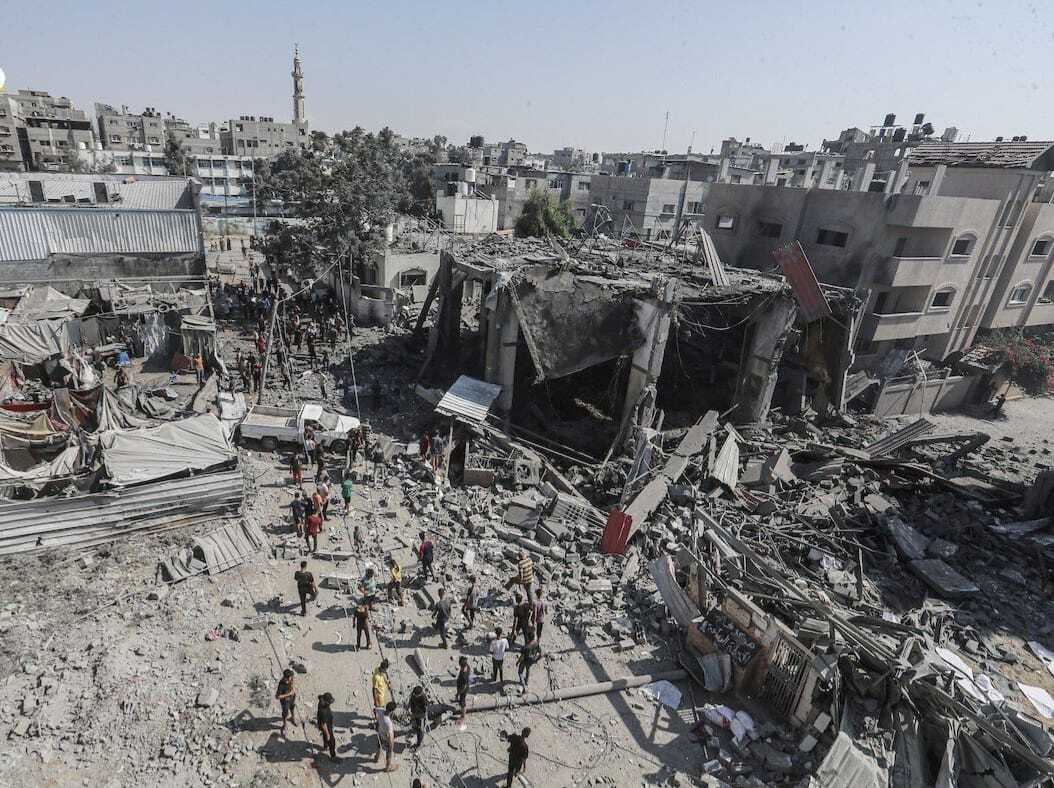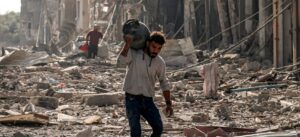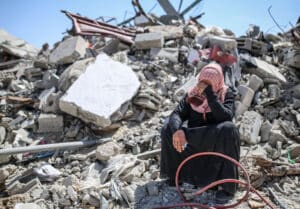I have lived in Gaza all my life, and for 30 years have been a journalist, which means I have witnessed a lot of violent conflict. But when I woke up to the booms of rockets being fired towards Israel on October 7 last year, this attack felt different. I went on to the roof of my house in Al-Bureij, in the middle of the Gaza Strip. From there, I could see armed men riding motorbikes through the wrecked security fence and entering Israel.
Immediately, I felt afraid. This was the first time that a Palestinian force had invaded our neighbour to kidnap and kill, and I expected Israel would respond very strongly. Ever since, I have known I could die at any time: walking on the street, sitting in my house, visiting my relatives. You can be talking to someone in the morning, and then you hear in the evening they are dead. Every day we pay the price for October 7, and this has a terrible psychological impact.
At first, many people here were happy about the attack: because of Israel’s siege of Gaza and its control of the Al-Aqsa mosque in Jerusalem, as well as previous conflicts. However, many have changed their minds. Even those who once voted for Hamas have turned against them, because they blame them for the disaster we have experienced.
I believe Hamas thought the war would end after one or two months, and that after that, the international community would intervene and stop it: they never imagined it would still be going on after a year. At the same time, Israel has not won the war. It has not destroyed Hamas or killed all its members. Its fighters are still here, refusing to run up the white flag, still making statements saying they intend to resist.
Hamas members aren’t seen very much in the streets, because there they risk being spotted from the air and targeted. But they appear, sometimes at night, and then they disappear: some are living in the tunnels, some in houses, others in tents. They come out to beat people they say are thieves with sticks and iron bars, and they punish their enemies, sometimes by killing them. They are still killing Israelis.
They conceal every piece of information. They never confirm the names of those who have been martyred, and they don’t say whether any of their leaders have been killed.
As for myself, I was a Leftist before I became a journalist. I have never supported Hamas, nor any kind of violence between Palestinians and Israelis. I have said all my life we should go for coexistence: I believe this land can absorb all its people, and that we can live with each other, side by side. Unfortunately, believing we need peace does not make it happen.
Two days after the attack began, my wife, our three children and I left our house because the neighbourhood was being shelled. We went to stay with one of my brothers, but after another two days it became too dangerous there, so at 2am one morning we took shelter in a UN school. It was extremely overcrowded and random shells were falling into the yard. When it got light we moved again, to a relative’s house in the Nuseirat refugee camp, where we stayed for 47 days, until the truce began in November and we returned home.
After the ceasefire, the war restarted even more violently than before. We always monitor the website of Israel’s civilian coordinators, and on 23 December, they issued a map of the areas they said people had to leave. Our house was on it, and we were told we had to evacuate immediately. We stayed four days with some relatives before the Israelis issued a revised map, forcing us to flee yet again.
This time, along with countless thousands of other displaced persons, we went to Rafah, in the south. It’s not very far, but the journey took four hours, and all that time we were scared of possible airstrikes. My brother and I rented two small rooms for ourselves and our families — 12 people in all, with no bathroom or kitchen. Rafah was supposed to be safe, but the area we were in was bombed several times. The weather was wet and cold and the roof dilapidated. It did not block the rain, and the walls were cracked and damp. But we had no choice, and it was better than living in tents. We found wood to make a fire and that became our kitchen.
We had been there nearly two months when we heard the Israelis were withdrawing from Al-Bureij, so we felt safe enough to go home. But it wasn’t long before the Israelis again declared it a “red zone” — so once more we fled, this time back to Nuseirat. There we heard violent explosions nearby and Israeli tanks on the move. We were very afraid, but there was nothing we could do. Everywhere had become unsafe. It seemed as if we were fleeing from one death to another. In July, we returned to our house one final time and stayed there. Somewhat miraculously, it had not been damaged. I would guess that by now, fewer than 30% of Gaza’s buildings remain standing.
The life we lead now is inhuman. I suppose we are lucky: in some areas, there is only running water for a short time every 10 days, whereas we usually get it one day in three. But we have to delay everything until it comes. Having enough water to be able to wash or take a shower is bliss. There are things you don’t realise how much you need until they are unavailable: like shampoo. We have no electricity, so after dark we depend on battery lights, and to charge our phones I have to pay a neighbour who has a solar panel. It is very hard to get gas in order to cook.
Hamas may not have been eliminated, but it is dangerous for their police to be on the streets, so there is anarchy. The distribution of most kinds of food is controlled by criminal gangs. They have guns, and steal imported food from those who receive it, mostly from charitable donors in places such as Qatar, Saudi Arabia and Egypt. Because there are no police to stop them, they hijack trucks and steal their contents, and two or three days later it appears in the markets at inflated prices. The price of many items, such as vegetables and eggs, has roughly tripled.
Meanwhile, there are no working banks or ATMs. I am still a journalist, working for a newspaper based in the West Bank, although I cannot travel anywhere to report. I am still receiving a salary, but the only way I can get cash is from money changers, profiteers who take more than 20% as their commission.

Yet set beside the fate of others, these are merely inconveniences. We lost my nephew, Muntezar, in Rafah: when we left he stayed on because of his job with the electricity company, which had promised him an increased salary if he remained. He wasn’t a fighter but an ordinary worker who had two little boys. I was close to him, and he had no interest in politics, but his house was hit and he was killed, alongside two of his wife’s brothers. My wife’s sister was killed with four of her children and her grandson, in a strike on an apartment building that killed more than 30 people in Nuseirat near the beginning of the war.
One of my wife’s brothers perished from an airstrike along with his two sons; another with his wife, two sons and three grandsons. You expect you may lose someone all the time: any time your phone rings you rush to answer it, in case it is someone telling you another relative has been killed.
One afternoon three weeks ago, there was an airstrike on the building opposite our house, which is just eight metres away. We were sitting in our downstairs living room when there was an enormous blast. All our windows were destroyed, and we were covered in smoke, broken glass, and thick, black dust. I couldn’t see, I could only hear, and my family were screaming and crying. At last, some neighbours came and took us outside and we sat in the open air in order to breathe.
We’ve been trying to fix the damage ever since, but we have no glass to replace the windows. We don’t know what will happen during the winter, when the nights begin to get cold. We had to throw away lots of food because it had been polluted by dust and chemicals from the rockets.
Like most people in Gaza, we long for the war to stop, and try to return to normality. But no one seems to be applying any pressure to make this happen. Israel doesn’t want to finish this war, because that would mean its Prime Minister would have to go to court to face charges of corruption, and his government would collapse. The fanatical Right-wing politicians in his cabinet would also lose power.
But Hamas will not surrender. Their religion means they believe that if they are killed, they will go to paradise, and all the time they say they will not stop. They are waiting, hoping that something will change. For a long time they waited for Hezbollah to enter the war, and now they have; they were waiting for Nasrallah, though now he is dead. They are waiting for help from Iran and from Yemen, though no one has any idea what will happen when it comes.
All I know is that while Hamas waits, we continue to pay the price.
Disclaimer
Some of the posts we share are controversial and we do not necessarily agree with them in the whole extend. Sometimes we agree with the content or part of it but we do not agree with the narration or language. Nevertheless we find them somehow interesting, valuable and/or informative or we share them, because we strongly believe in freedom of speech, free press and journalism. We strongly encourage you to have a critical approach to all the content, do your own research and analysis to build your own opinion.
We would be glad to have your feedback.
Source: UnHerd Read the original article here: https://unherd.com/



